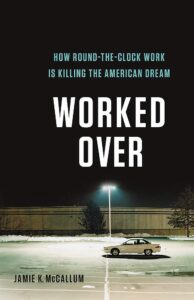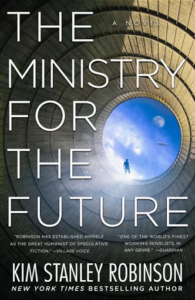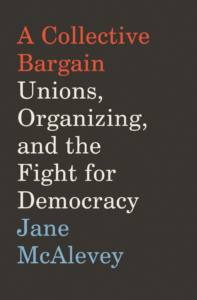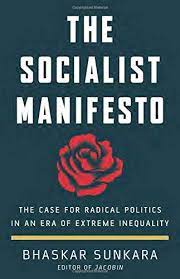Living on the Job, a review by Laura Adler
Volume 30, Issue 3, Fall 2021

Worked Over: How Round-the-Clock Work Is Killing the American Dream
By Jamie K. McCallum
In a now notorious clip from 2004, George W. Bush sits on a stool onstage, next to a white woman around sixty years old with her hair anachronistically styled up. She is worried about changes to Social Security, and Bush notes that she, like many others with these concerns, is “near retirement.” “We are living longer and people are working longer,” Bush remarks, “but nevertheless there’s a certain comfort to know that the promises made will be kept by the government.” She responds, “That’s good because I work three jobs and I feel like I contribute.” Bush looks startled. “You work three jobs?” She responds firmly, “Three jobs, yes.” He takes a pause and turns smiling to the audience. “Uniquely American innit? I mean that is fantastic that you’re uh, doing that,” he descends into mumbles over tentative applause.
Uniquely American that a woman in her sixties must work three jobs to get by—and uniquely American . . .
Read more here
The Low Carbon Good Life, a review by Simon Torracinta
Volume 30, Issue 2, Spring 2021

Post-Growth Living: For an Alternative Hedonism
By Kate Soper
The last four years have seen a tremendous surge in energy and unprecedented social movement mobilization around the threat of climate change. In the United States, its main thrust has been the call for a Green New Deal, but similar policy responses are emerging across the world, from the European Union’s Green Deal framework to China’s recent pledge of carbon neutrality before 2060. The bulk of attention in these initiatives is devoted to the decarbonization of the energy sector, and the rapid deployment of renewable technologies like wind and solar. Yet as the British philosopher Kate Soper argues in Post-Growth Living: For An Alternative Hedonism, they largely skirt the politically sensitive issue of consumption. . .
Read more here
A Chinese Dystopia: Designed in California, a review by Nelson Lichtenstein
Volume 30, Issue 1, Winter 2021

Dying for an iPhone: Apple, Foxconn and the Lives of China’s Workers
By Jenny Chan, Mark Selden, and Pun Ngai
The title of this book is not metaphorical. Between January and November 2010, eighteen Foxconn workers attempted suicide, all but one by leaping from a high floor of their company dormitory. Four survived with injuries.
Five were women and thirteen men, all between the ages of 17 and 25 years. The suicides created an international sensation, both for Foxconn and for Apple, the iconic cell phone and laptop company that has contracted with a host of Chinese suppliers to manufacture a dazzling array of products. Foxconn was by far Apple’s biggest contract manufacturer, and both companies scrambled to stop these tragedies. Foxconn beefed up its mental health outreach, closed off balconies, and erected nets extending outward from lower dormitory floors. Apple called for more inspections and better working conditions, but like . . .
Read more here


 Our Veterans: Winners, Losers, Friends and Enemies on the New Terrain of Veterans Affairs
Our Veterans: Winners, Losers, Friends and Enemies on the New Terrain of Veterans Affairs From bop performances in a renowned jazz club and illicit parties hosted in a basement on 12th street, to card games behind the boss’ back in the breakroom of an auto-stamping plant, playwright Dominique Morisseau tells the story of Detroit across three plays that comprise The Detroit Project. Morisseau, the recipient of a MacArthur Genius Grant, describes a social history of rising “the hell up” while going underground. The trilogy has rightfully been compared to August Wilson’s ten-play Pittsburgh Cycle in the way the plays ambitiously set out to tell the intergenerational story of each playwright’s hometown.
From bop performances in a renowned jazz club and illicit parties hosted in a basement on 12th street, to card games behind the boss’ back in the breakroom of an auto-stamping plant, playwright Dominique Morisseau tells the story of Detroit across three plays that comprise The Detroit Project. Morisseau, the recipient of a MacArthur Genius Grant, describes a social history of rising “the hell up” while going underground. The trilogy has rightfully been compared to August Wilson’s ten-play Pittsburgh Cycle in the way the plays ambitiously set out to tell the intergenerational story of each playwright’s hometown. The Ministry for the Future
The Ministry for the Future


 A Collective Bargain: Unions, Organizing, and the Fight for Democracy
A Collective Bargain: Unions, Organizing, and the Fight for Democracy The Socialist Manifesto: The Case for Radical Politics in an Era of Extreme Inequality
The Socialist Manifesto: The Case for Radical Politics in an Era of Extreme Inequality

